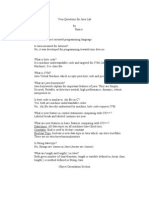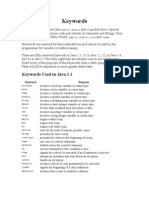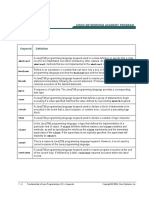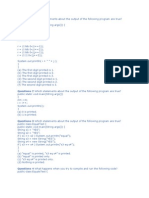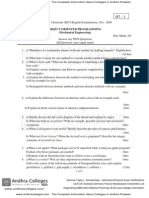0 ratings0% found this document useful (0 votes)
31 viewsKeywords in Java Description: Java Programming Package Synchronized Blocks
The document defines keywords in Java and provides a brief description of each keyword. Some key keywords include abstract for abstract classes, continue to continue to the next iteration of a loop, for for looping, new to create objects, switch for conditional checking, assert for validating conditions, default for switch statements, package for grouping classes and interfaces, synchronized for thread synchronization, boolean for true/false values, do while for looping until a condition is met, if for conditional checking, private for restricting access, this for referring to the current object, break to exit loops, double for floating-point numbers, implements for implementing interfaces, protected for restricting access, throw for throwing exceptions, byte for 8-bit integer, else for alternative code blocks,
Uploaded by
Al-muhaimen BatawanCopyright
© © All Rights Reserved
We take content rights seriously. If you suspect this is your content, claim it here.
Available Formats
Download as DOCX, PDF, TXT or read online on Scribd
0 ratings0% found this document useful (0 votes)
31 viewsKeywords in Java Description: Java Programming Package Synchronized Blocks
The document defines keywords in Java and provides a brief description of each keyword. Some key keywords include abstract for abstract classes, continue to continue to the next iteration of a loop, for for looping, new to create objects, switch for conditional checking, assert for validating conditions, default for switch statements, package for grouping classes and interfaces, synchronized for thread synchronization, boolean for true/false values, do while for looping until a condition is met, if for conditional checking, private for restricting access, this for referring to the current object, break to exit loops, double for floating-point numbers, implements for implementing interfaces, protected for restricting access, throw for throwing exceptions, byte for 8-bit integer, else for alternative code blocks,
Uploaded by
Al-muhaimen BatawanCopyright
© © All Rights Reserved
We take content rights seriously. If you suspect this is your content, claim it here.
Available Formats
Download as DOCX, PDF, TXT or read online on Scribd
You are on page 1/ 3
Keywords in Java Description
A class that is declared with abstract keyword, is known as abstract
abstract class in java. It can have abstract and non-abstract methods (method
with body).
It is is allowed only inside a loop body. When continue executes, the
continue current iteration of the loop body terminates, and execution continues
with the next iteration of the loop.
For is used for looping. It involves initialization, a boolean expression,
and incrementation/decrementation. It supports repeated execution of a
for
statement or block of statements that is controlled by an iterable
expression.
new used to create an instance of a class, or an object.
switch Used as a statement which executes when it matches to a specific case.
Assert keyword is added in 1.4 version. It describes a predicate (true-
assert false statement), to let developers think that it’s always true. If an
assertion is false at run-time, it causes execution to abort.
default Used in a switch statement to execute a block of code in the loop.
goto goto has no function and it is no more supported in Java programming.
package is a mechanism of grouping similar type of classes, interfaces,
package
and sub-classes collectively based on functionality.
Synchronized blocks in Java are marked with the Synchronized
keyword. This block in Java is synchronized on some object. All blocks
synchronized
that are synchronized on the same object can only have one thread
executing inside them at a time.
boolean boolean can hold true or false value only.
It is used in control statements. The Java do-while loop is used to iterate
do
a set of statements until the given condition is satisfied.
If statement is used to test an expression and execute certain
if statements accordingly. It is also used to create an if-else statement in
java.
Private is an access modifier in java, where the methods or data
private members that are declared as private are only accessible within the
class in which they are declared.
this keyword in Java represents the current instance of a class. It is
this
mainly used to access other members of the same class.
The break statement is allowed only inside a loop body. When break
break
executes, the loop terminates.
double It declares a variable that can hold 64-bit double floating-point numbers.
implements used by a class to implements an interface.
The methods or data members that are declared as private are only
protected
accessible within the class in which they are declared.
throw used to create and throw an exception.
byte It is used to declare a field which can hold 8-bit data values.
else It is used to implement a condition alternate to if condition.
import Used in the beginning which refers to other classes
Classes, methods or data members which are declared as public are
public accessible anywhere throughout the program. There is no restriction on
the scope of public data members.
Used in method declarations which specifies exceptions that can’t be
throws
handled within the method.
used in the switch statements which can be labeled with one or more
case
case
enum Enum is added in 5.0 version.
It evaluates to true if and only if the runtime type of the object is
instanceof
compatible with the class or interface.
Used to finish the execution of a method. It returns the value required by
return
the method.
It declares an instance field which is not a part of the default serialized
transient
form of an object.
Statements in the catch block specify the exceptions generated by try
catch
block.
extends Merely indicates that a class has extended its immediate class.
int A data type that holds 32 bit signed integer.
short A data type that holds a 16-bit integer.
try It tests a block of code for exceptions.
char It is a data type that can hold a 16-bit unsigned integer.
Once a certain entity is defined, it cannot be changed nor derived from
final
later.
Interface in Java refers to the abstract data types. They allow Java
interface collections to be manipulated independently from the details of their
representation.
static keyword is mainly used for memory management. It can be used
static
with variables, methods, blocks and nested classes.
void It returns a null value for a method.
It creates a new class in Java which is a blueprint from which
class
an object is created.
It specifies that a block of code under exception handling always gets
finally
executed.
long Data type holding a 64 bit integer.
strictfp strictfp keyword is added in 1.2 version.
volatile Specifies or indicates that a variable might change asynchronously.
const This const java keyword is no more used.
float A data type holding a 32-bit floating point number.
It specifies that a method declaration has tobe done from platform-
native
specific(native) code.
super keyword refers to the members such as variable,method and
super
constructor of of immediate super class.
It is used to create while loop.The Java while loop is used to iterate a
while part of the program again and again. If the number of iteration is not
fixed, then you can use while loop.
You might also like
- Atmel 8984 CryptoAuth CryptoAuthLib ApplicationNoteNo ratings yetAtmel 8984 CryptoAuth CryptoAuthLib ApplicationNote25 pages
- Java: Programming: Your Step by Step Guide to Easily Learn Java in 7 DaysFrom EverandJava: Programming: Your Step by Step Guide to Easily Learn Java in 7 Days4/5 (30)
- Java 2 Standard Edition 1.5.0 Keyword ReferenceNo ratings yetJava 2 Standard Edition 1.5.0 Keyword Reference21 pages
- Java Keywords - Javatpoint - Reader ViewNo ratings yetJava Keywords - Javatpoint - Reader View2 pages
- Module-I: Encapsulation: Is The of Binding The Data and MethodsNo ratings yetModule-I: Encapsulation: Is The of Binding The Data and Methods68 pages
- Java Glossary: Compiled by A Passionate Java ProgrammerNo ratings yetJava Glossary: Compiled by A Passionate Java Programmer46 pages
- Advanced JAVA Interview Questions You'll Most Likely Be AskedFrom EverandAdvanced JAVA Interview Questions You'll Most Likely Be AskedNo ratings yet
- Java Exception Handling Demystified: A Practical Guide with ExamplesFrom EverandJava Exception Handling Demystified: A Practical Guide with ExamplesNo ratings yet
- JAVA for Beginner's Crash Course: Java for Beginners Guide to Program Java, jQuery, & Java ProgrammingFrom EverandJAVA for Beginner's Crash Course: Java for Beginners Guide to Program Java, jQuery, & Java Programming4/5 (1)
- Object-Oriented Programming (OOP) : It Is A Programming Paradigm That RepresentsNo ratings yetObject-Oriented Programming (OOP) : It Is A Programming Paradigm That Represents10 pages
- Mutable, Immutable, and Cloneable ObjectsNo ratings yetMutable, Immutable, and Cloneable Objects26 pages
- 09 Jedi Intro To Programming Student ManualNo ratings yet09 Jedi Intro To Programming Student Manual241 pages
- JAVA Sample Questions For Practice (II CSE - A' & II IT - B')No ratings yetJAVA Sample Questions For Practice (II CSE - A' & II IT - B')5 pages
- CBSE Class 12 Computer Science Object Oriented Programming ConceptsNo ratings yetCBSE Class 12 Computer Science Object Oriented Programming Concepts17 pages
- State Board of Cricket Council - Requirement Document 5No ratings yetState Board of Cricket Council - Requirement Document 510 pages
- Object Oriented Programming (Mechanical Engineering)No ratings yetObject Oriented Programming (Mechanical Engineering)13 pages
- Anylogic Agent Based Modeling Technology Overview80% (5)Anylogic Agent Based Modeling Technology Overview84 pages
- Computer Science (ISC) Sample Practice Paper 275% (4)Computer Science (ISC) Sample Practice Paper 29 pages
- C Interview Questions: Q1) - What Is C Programming Language?No ratings yetC Interview Questions: Q1) - What Is C Programming Language?58 pages
- SI (Lab Exam) : COMSATS Institute of Information Technology, LahoreNo ratings yetSI (Lab Exam) : COMSATS Institute of Information Technology, Lahore2 pages


